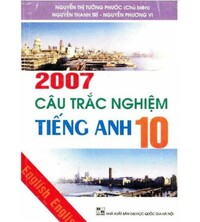Tiếng Anh 10 Bright Unit 4 4.b Grammar
1. Match the sentences (1–9) to the uses (a–i) of their tenses. 2. Fill in each gap using is/are going to, will or won’t. 3. Put the verbs in brackets in the Present Simple or the Present Continuous. 4. Put the verbs in brackets into the Present Simple, Present Continuous, be going to, or will. 5. Tell your partner about your future predictions, your future plans and your fixed arrangements for the weekend as in the example. 6. Read the theory box. How do the two conditionals differ? 7. Put the
Bài 1
1. Match the sentences (1–9) to the uses (a–i) of their tenses.
(Nối các câu (1-9) với cách sử dụng (a – i) của chúng.)
|
1 |
|
She’s late again. I will talk to the manager.
|
2 |
|
Stop behaving like that or I will report you.
|
3 |
|
The bus to work leaves at 7 o’clock.
|
4 |
|
Look out! You are going to fall.
|
5 |
|
I promise I will call you as soon as I get back from work.
|
6 |
|
I think Kathy will be a doctor.
|
7 |
|
I am seeing the manager at 3:30 p.m.
|
8 |
|
I am going to start work next Monday.
|
9 |
|
I will be 16 next month.
a. a future intention/plan
b. an on-the-spot decision
c. a prediction based on what we see
d. a prediction about the future based on what we think/believe
e. a promise
f. a threat
g. a fixed arrangement
h. a schedule
i. a future fact
Phương pháp giải:
Lời giải chi tiết:
|
1. b |
4. c |
7. g |
|
2. f |
5. e |
8. a |
|
3. h |
6. d |
9. i |
1. She’s late again. I will talk to the manager. - b. an on-the-spot decision
(Cô ấy lại đến muộn. Tôi sẽ nói với người quản lý. - b. một quyết định ngay bây giờ)
2. Stop behaving like that or I will report you. - f. a threat
(Đừng cư xử như vậy nữa nếu không tôi sẽ tố cáo bạn. - f. Một mối đe dọa)
3. The bus to work leaves at 7 o’clock. - h. a schedule
(Xe buýt đến chỗ làm khởi hành lúc 7 giờ. - h. một lịch trình)
4. Look out! You are going to fall. - c. a prediction based on what we see
(Nhìn kìa! Bạn sẽ rơi đấy. - c. dự đoán dựa trên những gì chúng ta thấy)
5. I promise I will call you as soon as I get back from work. - e. a promise
(Tôi hứa tôi sẽ gọi cho bạn ngay khi tôi đi làm về. – e. một lời hứa)
6. I think Kathy will be a doctor. - d. a prediction about the future based on what we think/believe
(Tôi nghĩ Kathy sẽ trở thành bác sĩ. – d. một dự đoán về tương lai dựa trên những gì chúng ta nghĩ/ tin)
7. I am seeing the manager at 3:30 p.m. - g. a fixed arrangement
(Tôi sẽ gặp quản lý vào lúc 3 giờ rưỡi chiều. – g. một kế hoạch đã lên lịch sẵn)
8. I am going to start work next Monday. - a. a future intention/plan
(Tôi sẽ bắt đầu công việc vào thứ hai tới – a. một dự định/ kế hoạch trong tương lai)
9. I will be 16 next month. - i. a future fact
(Tôi sẽ sang tuổi 16 vào tháng tới – i. một sự thật trong tương lai)
Bài 2
2. Fill in each gap using is/are going to, will or won’t.
(Điền vào mỗi chỗ trống bằng cách sử dụng is / are going to, will hoặc won’t.)
1. Paul ______________ arrange a meeting about gender equality next month.
2. Finish the report or the manager ______________ be happy with you.
3. I promise I ______________ text you as soon as I finish the meeting.
4. Hurry up, Mary! The sky is very dark. It ______________ rain soon.
5. It’s very hot in here. I ______________ open the window.
6. I’m sure Kelly ______________ miss out on the promotion because she works very hard.
7. Hugo ______________ be 20 next May.
8. Be careful! You ______________ spill your coffee on your computer.
Phương pháp giải:
Lời giải chi tiết:
1. Paul is going to arrange a meeting about gender equality next month.
(Paul sẽ sắp xếp một cuộc hội nghị về bình đẳng giới vào tháng tới.)
Giải thích: một dự định/ kế hoạch trong tương lai -> chia “be going to”. Chủ ngữ là “Paul” -> chia “is going to”.
2. Finish the report or the manager won’t be happy with you.
(Hoàn thành báo cáo nếu không người quản lý sẽ không hài lòng với bạn.)
Giải thích: mối đe dọa -> chia “will/won’t”. Nếu không hoàn thành báo cáo thì quản lý sẽ không hài lòng -> chia “won’t”.
3. I promise I will text you as soon as I finish the meeting.
(Tôi hứa tôi sẽ nhắn tin cho bạn ngay khi tôi kết thúc cuộc họp.)
Giải thích: một lời hứa -> chia “will”.
4. Hurry up, Mary! The sky is very dark. It is going to rain soon.
(Nhanh lên, Mary! Bầu trời rất tối. Trời sắp mưa rồi.)
Giải thích: dự đoán dựa trên những gì người ta thấy -> chia “be going to”. Chủ ngữ là “it” -> chia “is going to”.
5. It’s very hot in here. I will open the window.
(Ở đây rất nóng. Tôi sẽ mở cửa sổ.)
Giải thích: một quyết định ở hiện tại -> chia “will”.
6. I’m sure Kelly won’t miss out on the promotion because she works very hard.
(Tôi chắc chắn Kelly sẽ không bỏ lỡ cơ hội thăng chức vì cô ấy đã làm việc rất chăm chỉ.)
Giải thích: một dự đoán về tương lai dựa trên những gì ta nghĩ -> chia “will/won’t”. Vì cô ấy chăm chỉ nên sẽ không bỏ lỡ cơ hội thăng chức -> chia “won’t”.
7. Hugo will be 20 next May.
(Hugo sẽ sang tuổi 20 vào tháng năm tới.)
Giải thích: một sự thật trong tương lai -> chia “will”.
8. Be careful! You are going to spill your coffee on your computer.
(Hãy cẩn thận! Bạn sẽ làm đổ cà phê lên máy tính của bạn đấy.)
Giải thích: có “Be careful!” (câu mệnh lệnh) -> chia “be going to”. Chủ ngữ là “you” -> chia “are going to”.
Bài 3
3. Put the verbs in brackets in the Present Simple or the Present Continuous.
(Đặt những từ trong ngoặc vào thì Hiện tại đơn hoặc Hiện tại tiếp diễn.)
1. What time ___________________ (the plane/depart)?
2. We ___________________ (have) a business meeting this afternoon.
3. The company ___________________ (open) at 9 o’clock every morning.
4. ___________________ (you/see) the doctor today?
5. The shops here ___________________ (close) at 6 o’clock every Saturday.
6. The company ___________________ (hold) its Women at Work event this Friday.
Phương pháp giải:
Present Simple (Hiện tại đơn): dùng để diễn tả một sự thật hiển nhiên hay một hành động lặp đi lặp lại theo thói quen, lịch trình …
Cấu trúc Present Simple (Hiện tại đơn) với động từ thường:
Câu khẳng định: S + V(s/es) + …
Câu phủ định: S + do/ does + not + V bare + …
Câu hỏi: (từ để hỏi)+ do/does + S + V bare +… ?
Present Continuous (Hiện tại tiếp diễn): dùng để diễn tả hành động xảy ra ngay thời điểm nói hay là một hành động tạm thời.
Cấu trúc Present Continuous (Hiện tại tiếp diễn):
Câu khẳng định: S + am/is/are + V – ing
Câu phủ định: S + am/is/are + not + V – ing
Câu hỏi: Am/Is/Are + S + V – ing ?
Lời giải chi tiết:
1. What time does the plane depart?
(Mấy giờ máy bay khởi hành?)
Giải thích: hỏi về lịch trình -> chia thì hiện tại đơn.
2. We are having a business meeting this afternoon.
(Chúng tôi sẽ có một cuộc họp kinh doanh chiều nay.)
Giải thích: “this afternoon” -> chia thì hiện tại tiếp diễn.
3. The company opens at 9 o’clock every morning.
(Công ty mở cửa vào lúc 9 giờ mỗi sáng.)
Giải thích: một lịch trình -> chia thì hiện tại đơn.
4. Are you seeing the doctor today?
(Bạn có gặp bác sĩ vào hôm nay không?)
Giải thích: “today” -> chia thì hiện tại tiếp diễn.
5. The shops here close at 6 o’clock every Saturday.
(Các cửa hàng ở đây đóng cửa lúc 6 giờ thứ bảy hàng tuần.)
Giải thích: một lịch trình -> chia thì hiện tại đơn.
6. The company is holding its Women at Work event this Friday.
(Công ty sẽ tổ chức sự kiện Women at Work vào thứ Sáu tuần này.)
Giải thích: một kế hoạch đã lên lịch sẵn -> chia thì hiện tại tiếp diễn.
Bài 4
4. Put the verbs in brackets into the Present Simple, Present Continuous, be going to, or will.
(Đặt các động từ trong ngoặc vào thì Hiện tại đơn, Hiện tại tiếp diễn, be going to, hoặc will.)
1. Be careful! You ______________ (drop) the camera.
2. ______________ (Jane/spend) the summer working in the computer shop?
3. I promise I ______________ (not/download) any files onto your computer.
4. The meeting ______________ (start) at 4:00 p.m. Be there on time, please.
5. Rachel thinks she ______________ (get) a promotion soon.
6. “I’m a bit hungry.” – “I ______________ (order) you a sandwich.”
7. We ______________ (leave) for Hanoi tonight. Here are our tickets.
8. They ______________ (run) training sessions for women who want a career in science. It’s their plan to start next May.
Phương pháp giải:
Lời giải chi tiết:
1. Be careful! You are going to drop the camera.
(Hãy cẩn thận! Bạn sẽ làm rơi máy ảnh đấy.)
Giải thích: có “Be careful!” (câu mệnh lệnh) -> chia “be going to”. Chủ ngữ là “you” -> chia “are going to drop”.
2. Is Jane going to spend the summer working in the computer shop?
(Có phải Jane sẽ dành cả mùa hè để làm việc trong cửa hàng máy tính không?)
Giải thích: nói về dự định đã lên lịch sẵn -> chia “be going to”. Câu hỏi có chủ ngữ là “Jane” -> chia “Is Jane going to spend”.
3. I promise I won’t download any files onto your computer.
(Tôi hứa tôi sẽ không tải bất kỳ tệp nào xuống máy tính của bạn đâu.)
Giải thích: có “promise”, “any” -> chia “won’t download”.
4. The meeting starts at 4:00 p.m. Be there on time, please.
(Cuộc họp bắt đầu lúc 4 giờ chiều. Vui lòng có mặt đúng giờ.)
Giải thích: lịch trình -> chia hiện tại đơn. “The meeting” số ít -> chia “starts”.
5. Rachel thinks she will get a promotion soon.
(Rachel nghĩ rằng cô ấy sẽ sớm được thăng chức.)
Giải thích: có “think” (một dự đoán về tương lai dựa trên những gì ta nghĩ) -> chia “will get”.
6. “I’m a bit hungry.” – “I will order you a sandwich.”
("Tớ hơi đói." - "Tớ sẽ gọi cho cậu một chiếc bánh sandwich.")
Giải thích: hành động xảy ra ở hiện tại (ngay thời điểm nói) -> chia “will order”.
7. We are leaving for Hanoi tonight. Here are our tickets.
(Chúng tôi sẽ đi Hà Nội vào tối nay. Đây là vé của chúng tôi.)
Giải thích: một dự định đã lên lịch sẵn -> chia hiện tại tiếp diễn. Chủ ngữ là “we” -> chia “are leaving”.
8. They are going to run training sessions for women who want a career in science. It’s their plan to start next May.
(Họ sẽ tổ chức các buổi đào tạo cho những phụ nữ muốn có sự nghiệp trong lĩnh vực khoa học. Kế hoạch của họ sẽ bắt đầu vào tháng 5 tới.)
Giải thích: một kế hoạch trong tương lai -> chia “be going to”. Chủ ngữ là “they” -> chia “are going to run”.
Bài 5
5. Tell your partner about your future predictions, your future plans and your fixed arrangements for the weekend as in the example.
(Nói với bạn bè về những dự đoán, kế hoạch trong tương lai và những lịch trình cố định của bạn vào cuối tuần như trong ví dụ.)
I don’t think I will work as a graphic designer. (future prediction)
I am going to be a doctor. (future plan)
I am visiting my parents this weekend. (fixed arrangement)
Phương pháp giải:
Lời giải chi tiết:
I don’t think I will work as a graphic designer. (future prediction)
(Tôi không nghĩ mình sẽ làm việc như một nhà thiết kế đồ họa.) (dự đoán trong tương lai)
I am going to be a doctor. (future plan)
(Tôi sẽ trở thành một bác sĩ. )(kế hoạch trong tương lai)
I am visiting my parents this weekend. (fixed arrangement)
(Tôi sẽ về thăm bố mẹ tôi vào cuối tuần này.) (lịch trình cố định)
I think I will fly cars in the future. (future prediction)
(Tôi nghĩ tôi sẽ lái ô tô trong tương lai.) (dự đoán trong tương lai)
I am going to be a flight attendant. (future plan)
(Tôi sẽ trở thành một tiếp viên hàng không.) (kế hoạch trong tương lai)
I am watching a film this weekend. (fixed arrangement)
(Tôi sẽ xem một bộ phim vào cuối tuần này.) (lịch trình cố định)
Bài 6
6. Read the theory box. How do the two conditionals differ?
(Đọc hộp lý thuyết. Hai câu điều kiện khác nhau như thế nào?)
CONDITIONAL TYPE 1 (FIRST CONDITIONAL)
|
if-clause |
result clause |
|
if + Present Simple |
will/won’t + base form of the main verb |
|
If I join this firm, |
I will get a good salary. |
We use conditional type 1 to talk about real situations that are likely to happen in the present/future.
NOTE: Unless = if not
Unless it rains, we’ll go out. (= If it doesn’t rain, we’ll go out.)
CONDITIONAL TYPE 2 (SECOND CONDITIONAL)
|
if-clause |
result clause |
|
if + Past Simple |
would + base form of the main verb |
|
If I got that job position, |
I would travel around the world. |
We use conditional type 2 to talk about unreal, imaginary situations in the present/future.
• We often use were instead of was in the if-clauses.
If Josh were interested in the job, he would accept it.
• To give advice, we use the expression: If I were you …
If I were you, I would ask for a pay raise.
Phương pháp giải:
CONDITIONAL TYPE 1 (FIRST CONDITIONAL)
(Câu điều kiện loại 1)
|
if-clause (mệnh đề if) |
result clause (mệnh đề kết quả) |
|
if + Present Simple (if + hiện tại đơn) |
will/won’t + base form of the main verb (will/won’t + dạng nguyên mẫu của động từ chính) |
|
If I join this firm, (Nếu tôi làm ở công ty này,) |
I will get a good salary. (Tôi sẽ có một mức lương cao.) |
We use conditional type 1 to talk about real situations that are likely to happen in the present/future.
(Chúng ta sử dụng câu điều kiện loại 1 để nói về những tình huống thực tế có khả năng xảy ra trong hiện tại / tương lai.)
NOTE (Lưu ý): Unless = if not
Unless it rains, we’ll go out. (= If it doesn’t rain, we’ll go out.)
(Nếu trời không mưa, chúng ta sẽ đi ra ngoài.)
CONDITIONAL TYPE 2 (SECOND CONDITIONAL)
(Câu điều kiện loại 2)
|
if-clause (mệnh đề if) |
result clause (mệnh đề kết quả) |
|
if + Past Simple (if + quá khứ đơn) |
would + base form of the main verb (would + dạng nguyên mẫu của động từ chính) |
|
If I got that job position, (Nếu tôi nhận được vị trí công việc này,) |
I would travel around the world. (tôi sẽ đi du lịch vòng quanh thế giới.) |
We use conditional type 2 to talk about unreal, imaginary situations in the present/future.
(Chúng ta sử dụng câu điều kiện loại 2 để nói về những tình huống không có thật, trong tưởng tượng ở hiện tại / tương lai.)
• We often use were instead of was in the if-clauses.
(Chúng ta thường sử dụng were thay vì was trong mệnh đề if.)
If Josh were interested in the job, he would accept it.
(Nếu Josh hứng thú với công việc này, anh ấy sẽ nhận lời.)
• To give advice, we use the expression: If I were you …
(Để đưa ra lời khuyên, chúng ta sử dụng cách diễn đạt: If I were you (Nếu tôi là bạn)…)
If I were you, I would ask for a pay raise.
(Nếu tôi là bạn, tôi sẽ yêu cầu tăng lương.)
Lời giải chi tiết:
- We use conditional type 1 to talk about real situations that are likely to happen in the present or future. We use conditional type 2 to talk about unreal, imaginary situations in the present or future.
(Chúng ta sử dụng câu điều kiện loại 1 để nói về những tình huống thực tế có khả năng xảy ra trong hiện tại hoặc tương lai. Chúng ta sử dụng câu điều kiện loại 2 để nói về những tình huống không có thực, trong tưởng tượng ở hiện tại hoặc tương lai.)
Bài 7
7. Put the verbs in brackets into the correct forms of the first conditional.
(Đặt các động từ trong ngoặc ở dạng đúng của câu điều kiện loại 1.)
1. Unless the company employs more women, it _____________ (lose) its female customers.
2. If I finish work early, we _____________ (have) dinner together.
3. She will accept the job offer unless she _____________ (have to) move abroad.
4. If you get the nurse’s job, you _____________ (work) shifts.
5. They _____________ (offer) him a better salary if he proves he can do the job.
6. We will work in the garden if it _____________ (not/rain).
Phương pháp giải:
|
if-clause (mệnh đề if) |
result clause (mệnh đề kết quả) |
|
if + Present Simple (if + hiện tại đơn) |
will/won’t + base form of the main verb (will/won’t + dạng nguyên mẫu của động từ chính) |
|
If I join this firm, (Nếu tôi làm ở công ty này,) |
I will get a good salary. (tôi sẽ có một mức lương cao.) |
Lời giải chi tiết:
1. Unless the company employs more women, it will lose its female customers.
(Nếu công ty không tuyển thêm nhiều phụ nữ hơn, công ty sẽ mất khách hàng nữ của mình.)
2. If I finish work early, we will have dinner together.
(Nếu tôi hoàn thành công việc sớm, chúng ta sẽ ăn tối cùng nhau.)
3. She will accept the job offer unless she has to move abroad.
(Cô ấy sẽ chấp nhận thỏa thuận công việc này nếu cô ấy không đi ra nước ngoài.)
4. If you get the nurse’s job, you will work shifts.
(Nếu bạn nhận công việc của y tá, bạn sẽ làm việc theo ca.)
5. They will offer him a better salary if he proves he can do the job.
(Họ sẽ đề nghị anh ta một mức lương tốt hơn nếu anh ta chứng minh được anh ta có thể làm được việc.)
6. We will work in the garden if it doesn’t rain.
(Chúng ta sẽ làm việc ở khu vườn nếu trời không mưa.)
Bài 8
8. Put the verbs in brackets into the correct forms of the second conditional. Add commas where necessary.
(Đặt các động từ trong ngoặc ở dạng đúng của câu điều kiện loại hai. Thêm dấu phẩy nếu cần thiết.)
1. If you caught (catch) the bus to work, you wouldn’t be late.
2. If we printed on both sides we _____________ (save) paper.
3. If I _____________ (be) you I’d study maths.
4. If Jenny were here she _____________ (help) you with the project.
5. We would get a higher salary if we _____________ (have) better qualifications.
6. If you typed the report it _____________ (be) easier to read.
7. It _____________ (help) the hospital if we had more nurses.
8. If Helen trained to be a cook she _____________ (find) a job in a restaurant easily.
Phương pháp giải:
|
if-clause (mệnh đề if) |
result clause (mệnh đề kết quả) |
|
if + Past Simple (if + quá khứ đơn) |
would + base form of the main verb (would + dạng nguyên mẫu của động từ chính) |
|
If I got that job position, (Nếu tôi nhận được vị trí công việc này,) |
I would travel around the world. (tôi sẽ đi du lịch vòng quanh thế giới.) |
Lời giải chi tiết:
1. If you caught the bus to work, you wouldn’t be late.
(Nếu bạn bắt xe buýt đi làm, bạn sẽ không bị trễ.)
2. If we printed on both sides, we would save paper.
(Nếu chúng ta in trên cả hai mặt, chúng ta sẽ tiết kiệm giấy.)
3. If I were you, I’d study maths.
(Nếu tôi là bạn, tôi sẽ học toán.)
4. If Jenny were here, she would help you with the project.
(Nếu Jenny ở đây, cô ấy sẽ giúp bạn với dự án này.)
5. We would get a higher salary if we had better qualifications.
(Chúng ta sẽ nhận được mức lương cao hơn nếu chúng ta có trình độ tốt hơn.)
6. If you typed the report, it would be easier to read.
(Nếu bạn đánh máy bản báo cáo, nó sẽ dễ đọc hơn.)
7. It would help the hospital if we had more nurses.
(Sẽ giúp ích cho bệnh viện nếu chúng ta có thêm y tá.)
8. If Helen trained to be a cook, she would find a job in a restaurant easily.
(Nếu Helen được đào tạo để trở thành đầu bếp, cô ấy sẽ dễ dàng tìm được việc làm trong một nhà hàng.)
Bài 9
9. Complete the sentences so that they are true for you.
(Hoàn thành các câu sau để chúng đúng với bạn.)
1. My parents would be happy if I studied physics .
2. I will get a high mark if _______________________ .
3. If I forget to do my homework, _______________________ .
4. I’d tell my teacher if _______________________ .
5. If I had more time, _______________________ .
Phương pháp giải:
Cấu trúc câu điều kiện loại 1:
|
if-clause (mệnh đề if) |
result clause (mệnh đề kết quả) |
|
if + Present Simple (if + hiện tại đơn) |
will/won’t + base form of the main verb (will/won’t + dạng nguyên mẫu của động từ chính) |
Cấu trúc câu điều kiện loại 2:
|
if-clause (mệnh đề if) |
result clause (mệnh đề kết quả) |
|
if + Past Simple (if + quá khứ đơn) |
would + base form of the main verb (would + dạng nguyên mẫu của động từ chính) |
Lời giải chi tiết:
1. My parents would be happy if I studied physics.
(Bố mẹ tôi sẽ rất vui nếu tôi học vật lý.)
2. I will get a high mark if I spend more time on studying.
(Tôi sẽ đạt điểm cao nếu tôi dành nhiều thời gian hơn cho việc học.)
3. If I forget to do my homework, my teacher won’t be happy.
(Nếu tôi quên làm bài tập về nhà, giáo viên của tôi sẽ không vui.)
4. I’d tell my teacher if I had any difficult problems with my project.
(Tôi sẽ nói với giáo viên của mình nếu tôi gặp bất kỳ vấn đề khó khăn nào với dự án của mình.)
5. If I had more time, I would visit SOS Children’s Village in Vietnam more often.
(Nếu tôi có nhiều thời gian, tôi sẽ đến thăm Làng trẻ em SOS ở Việt Nam thường xuyên hơn.)
Bài 10
Speaking (Nói)
10. Ask and answer questions using conditional type 1 or 2.
(Hỏi và trả lời bằng cách sử dụng câu điều kiện loại 1 hoặc 2.)
1. you / lost your tablet?
What would you do if you lost your tablet?
If I lost my tablet, I’d save up to buy a new one.
2. you / can’t find a part-time job this summer?
3. it / rains tomorrow?
4. your mum / lost her job?
5. you / didn’t have enough money for a new laptop?
Phương pháp giải:
Cấu trúc câu điều kiện loại 1:
|
if-clause (mệnh đề if) |
result clause (mệnh đề kết quả) |
|
if + Present Simple (if + hiện tại đơn) |
will/won’t + base form of the main verb (will/won’t + dạng nguyên mẫu của động từ chính) |
Cấu trúc câu điều kiện loại 2:
|
if-clause (mệnh đề if) |
result clause (mệnh đề kết quả) |
|
if + Past Simple (if + quá khứ đơn) |
would + base form of the main verb (would + dạng nguyên mẫu của động từ chính) |
Lời giải chi tiết:
1.
What would you do if you lost your tablet?
(Bạn sẽ làm gì nếu bạn làm mất máy tính bảng?)
If I lost my tablet, I’d save up to buy a new one.
(Nếu tôi làm mất máy tính bảng, tôi sẽ tiết kiệm để mua một cái mới.)
2.
What will you do if you can’t find a part-time job this summer?
(Bạn sẽ làm gì nếu bạn không thể tìm được một công việc bán thời gian vào mùa hè này?)
If I can’t find a part-time job this summer, I will volunteer at the animal shelter.
(Nếu tôi không thể tìm được việc làm bán thời gian vào mùa hè này, tôi sẽ làm tình nguyện viên tại trại động vật.)
3.
What will you do if it rains tomorrow?
(Bạn sẽ làm gì nếu ngày mai trời mưa?)
If it rains tomorrow, I will stay home and read a book.
(Nếu ngày mai trời mưa, tôi sẽ ở nhà và đọc sách.)
4.
What would you do if your mum lost her job?
(Bạn sẽ làm gì nếu mẹ bạn mất việc làm?)
If my mum lost her job, I would find a part-time job at the local restaurant to help her with some money.
(Nếu mẹ tôi mất việc, tôi sẽ tìm một công việc bán thời gian tại một nhà hàng địa phương để giúp bà kiếm chút tiền.)
5.
What would you do if you didn’t have enough money for a new laptop?
(Bạn sẽ làm gì nếu không có đủ tiền mua một chiếc máy tính xách tay mới?)
If I didn’t have enough money for a new laptop, I would do a part-time job to save enough money.
(Nếu tôi không có đủ tiền mua một chiếc máy tính xách tay mới, tôi sẽ làm một công việc bán thời gian để tiết kiệm đủ tiền.)
Search google: "từ khóa + timdapan.com" Ví dụ: "Tiếng Anh 10 Bright Unit 4 4.b Grammar timdapan.com"







